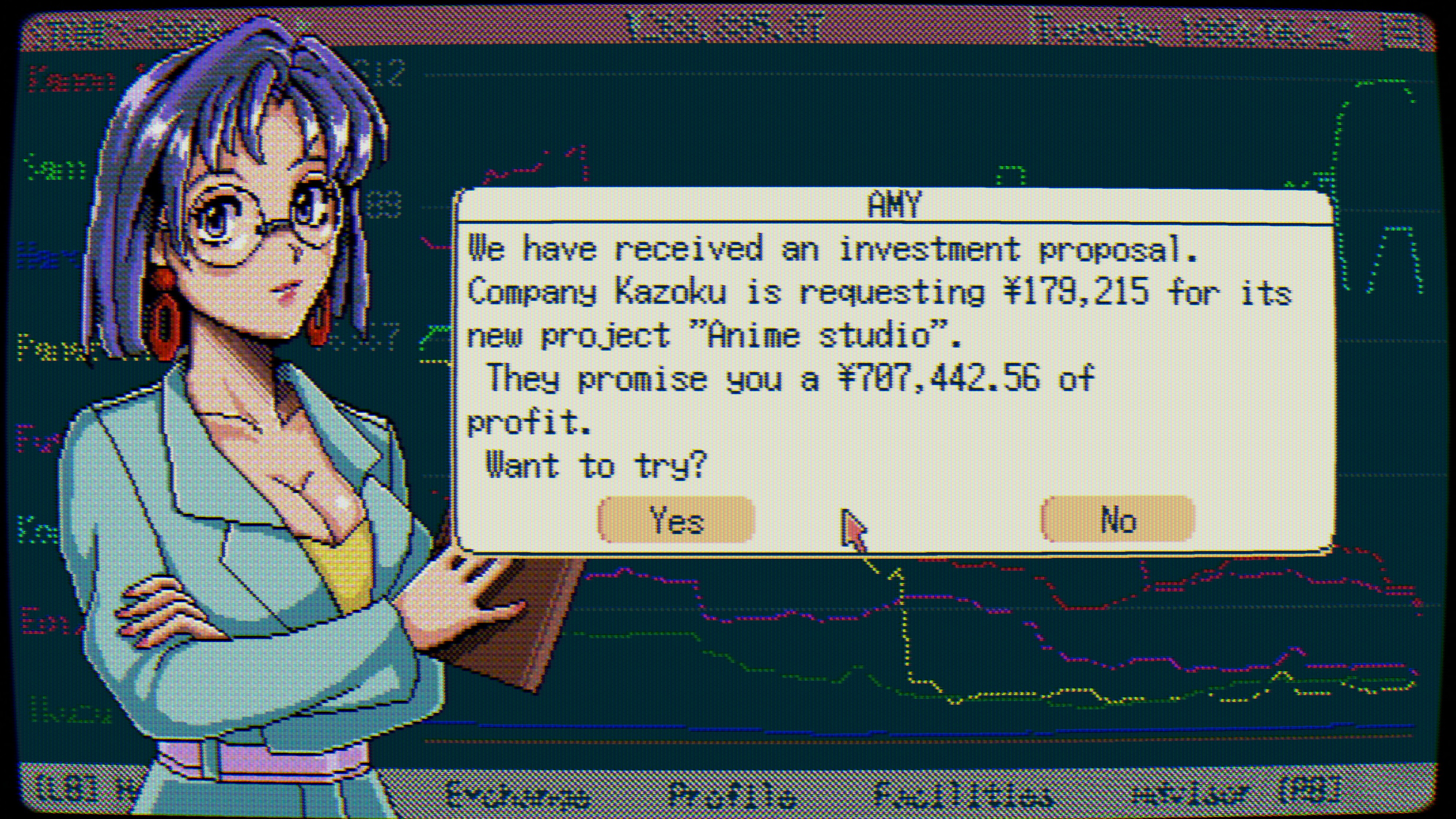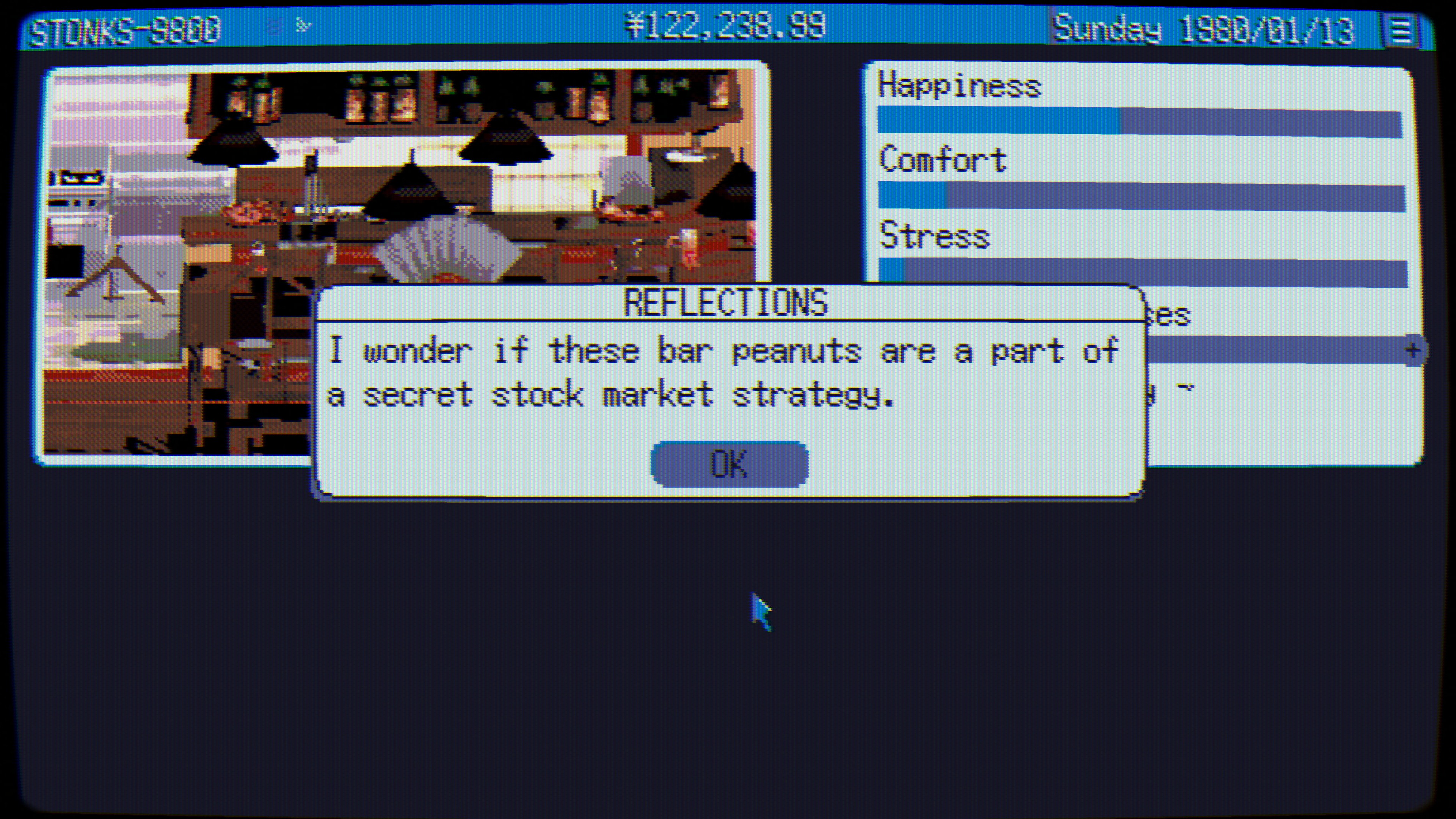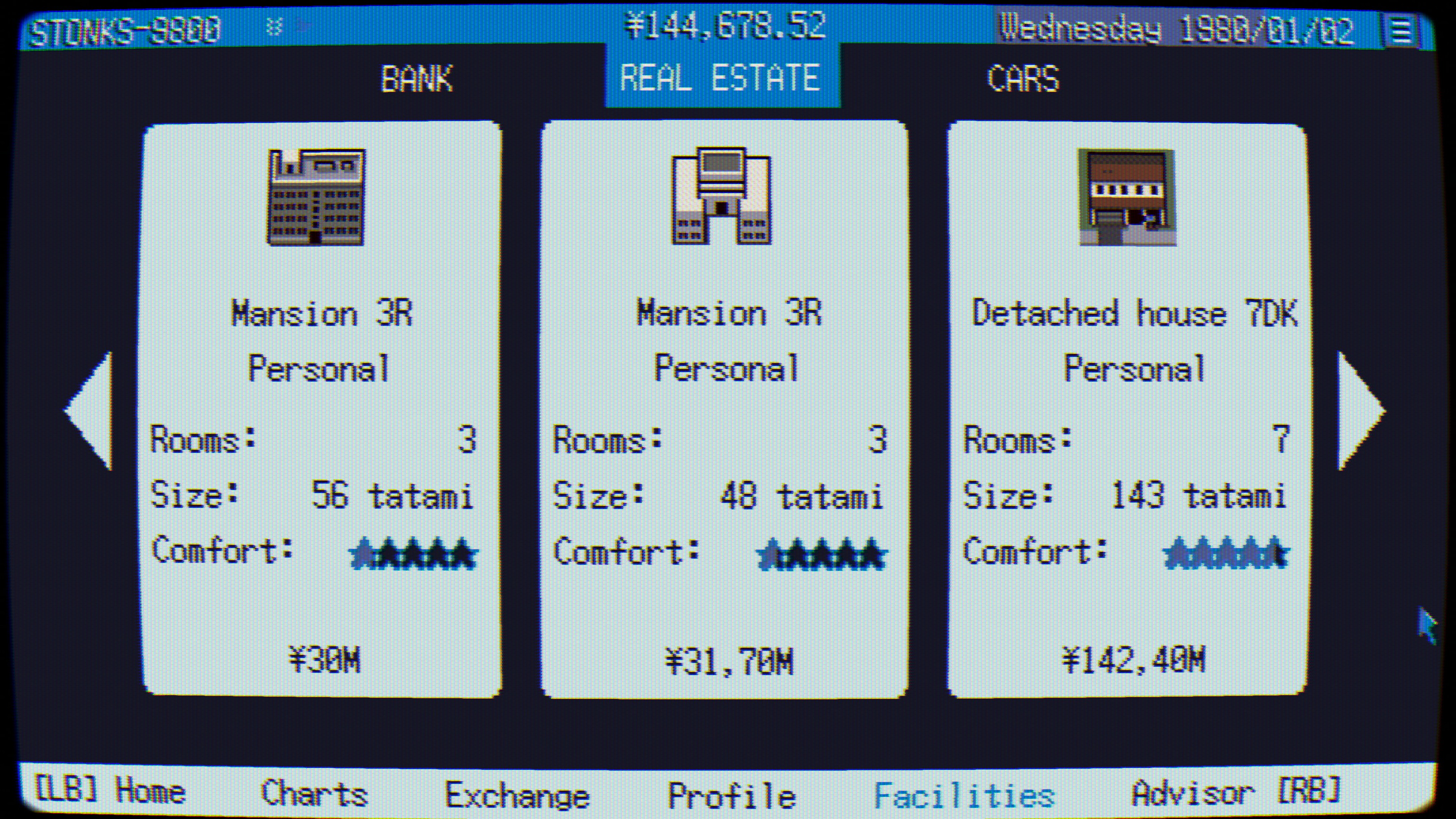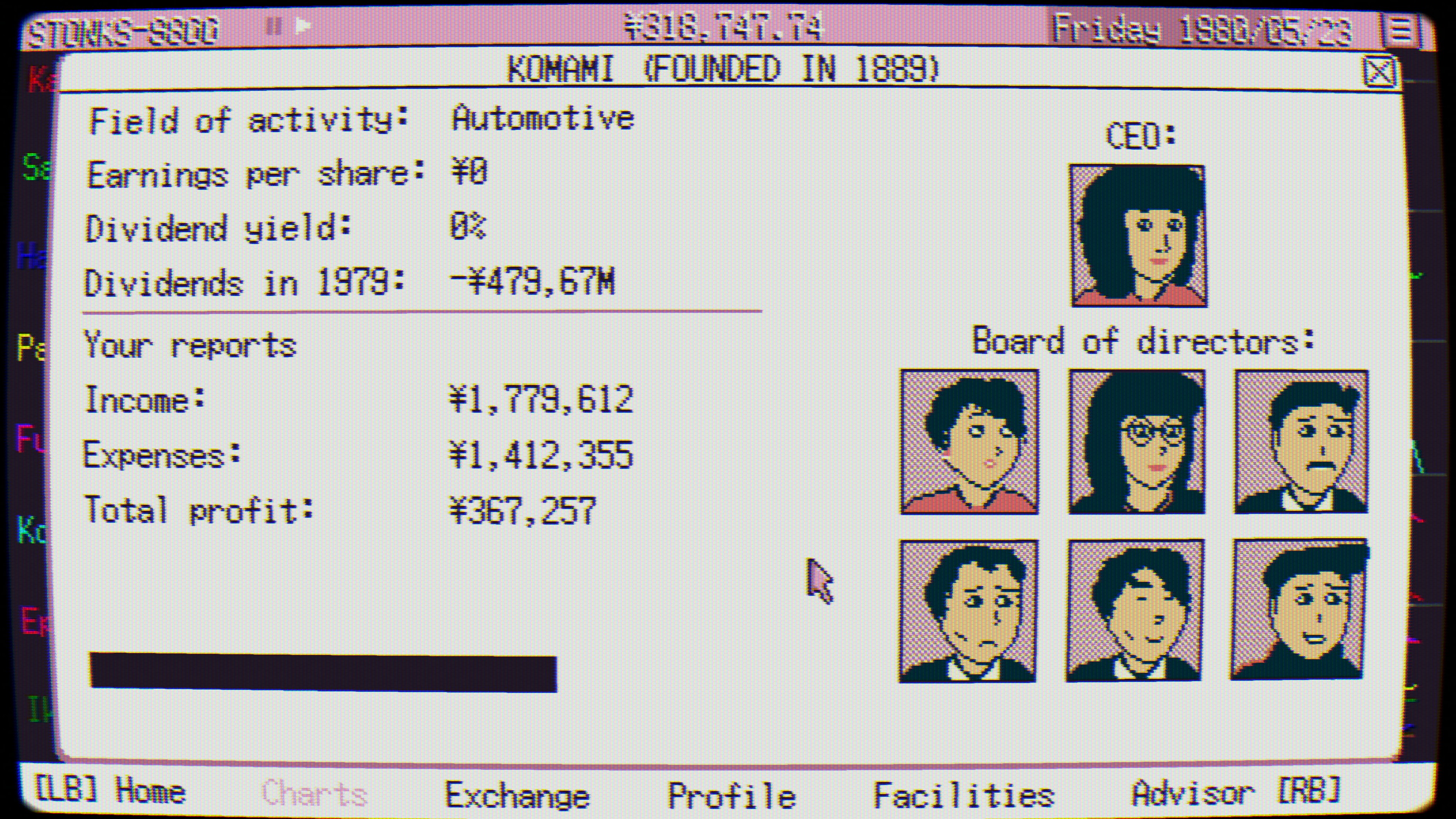I'm in love with this '80s Japan-themed stock-trading sim that sent me to prison for insider trading
Bug report: The rich only ever seem to get richer.

I am good at this. All my investments—fruitfully diversified across construction, telecoms, finance—are trending upwards. My contacts are a rarefied mix of the Japanese business world, a medley of glad-handing CEOs, shareholders and other people who seem to have a lot of money despite doing very little at all. The world is kind, my future is bright. I am living. I am thriving. I am going to prison for insider trading. Wait. What?
This is Stonks-9800, which just hit early access. I'm having an absolute blast with it right now. Set in the glittering, infinitely growing Japan of the 1980s economic boom, Stonks is a stock-trading sim that tasks you with building up a portfolio of shares to catapult you from your dingy 1-bed flat to a gleaming Daikanyama tower block. By carefully studying prevailing market conditions, interrogating the long-term business strategies of prospective investees, and adhering to a set of rigid ethical standards, you can carve out a fortune to support yourself and your family for generations.
Alright, no, I'm kidding. Just like real life, the secret is knowing enough people with insider info to rig the game in your favour and then evading arrest for it.
Welcome to the big leagues, son.
Rookie numbers
Look, before we get into the financial nitty-gritty, let me tell you this: Stonks-9800's '80s vibes are perfect. This is the first time I've played a game that emulated a CRT where everything just felt right. The art looks like an old anime you'd accidentally catch on a sick-day morning off school, and the soundtrack is filled with Sega Mega Drive-style bops. Not songs. Bops.
It's an excellent game to just be in, and that's before you hit the heady thrills of high finance.
Much like real-life stock trading, Stonks is to some extent a kind of idle game. You pick a share—ideally because you've gotten some kind of tip-off that it's about to take off—buy up a glut of stock, and wait. In an ideal world, those companies (which bear names like Sani, Panasenic, Kanon, and so on) light up the charts like a skyrocket, bring you fame and fortune, a new car and a sparkling reputation. In a less than ideal world? Destitution, ignominy, the censure of your peers and the delight of your enemies. Possibly jail time.
Keep up to date with the most important stories and the best deals, as picked by the PC Gamer team.

I suspect it mostly works by rolling dice in the background. Outside of some vague details about their sector, CEO, and board of directors, none of the companies that populate Stonks' line-graphs bear much resemblance to their real-life counterparts. A knowledge of which companies did set the charts on fire back in the 1980s won't really help you.
Instead, you either have to go with your gut or hope someone brings you a stock tip (which are sometimes wrong, mind you) the next time the game throws up an opportunity to hang out with one of your contacts. Alcohol is the real lubricant that keeps the engine of finance whirring, you see: Whenever you're out gadabouting with pals, it's an opportunity for one of them to drunkenly let slip an upcoming change in stock price. Want to go home early? Tough luck. Six more cups of sake could be the difference between losing your home or buying a new one.
Material girl
But wait, there's more. The life of a stock trader in 1980s Japan isn't just about being buffeted by the winds of financial fate. Alongside the wheeling and dealing, there's also a light life sim element to consider, that sees you manage your happiness, comfort, stress, and daily personal spending.
Downturns in fortune can stress you out, as can housing situations that leave something—heat, air, food—to be desired. Get too stressed, and it's off to the hospital. And when you're in hospital, you can't make it to the exchange to offload those cratering Sani shares that your idiot friend told you were a sure thing last week, can you? Thanks, Kazuya.

You can deal with it by buying nicer houses, nicer cars, jacking up your personal spending level, but these things all eat away at your ever-growing pile of treasures (and will demand you take on even deeper debt if those treasures are wiped out by that idiot Kazuya).
You've also got various reputation meters—how well-known you are for things like ethics, innovation, networking and so on—that can either open up or foreclose various avenues of opportunity as they rise and fall. Beyond that, you've got friendship meters with each of your contacts plus your assistant Amy, who provides a lot of the game's character. To be honest, I have no idea what increasing my friendship with Amy does, but mine is at level 3 right now and I can tell you I'd die to defend it.
Charting a course

Stonks-9800 has only just hit early access—you can find its development roadmap here—but I'll be watching it like a hawk from here on out. Some elements are a little shallow and many are currently underexplained, but it has such a clear idea of what it's going for and does such a good job of going for it that I'm still having an excellent time.
I'm especially eager to see what the "Improved Trading" milestone looks like. Making the stock-trading a little less opaque and luck-based will, I imagine, make it less frustrating when you inevitably screw up a deal. Beyond that, the prospect of getting hands-on with managing a company and the tantalising notion of "More yakuza events" are, frankly, tremendously exciting. Until then, keep holding Komami stock. Kazuya told me it was a definite thing.

One of Josh's first memories is of playing Quake 2 on the family computer when he was much too young to be doing that, and he's been irreparably game-brained ever since. His writing has been featured in Vice, Fanbyte, and the Financial Times. He'll play pretty much anything, and has written far too much on everything from visual novels to Assassin's Creed. His most profound loves are for CRPGs, immersive sims, and any game whose ambition outstrips its budget. He thinks you're all far too mean about Deus Ex: Invisible War.

